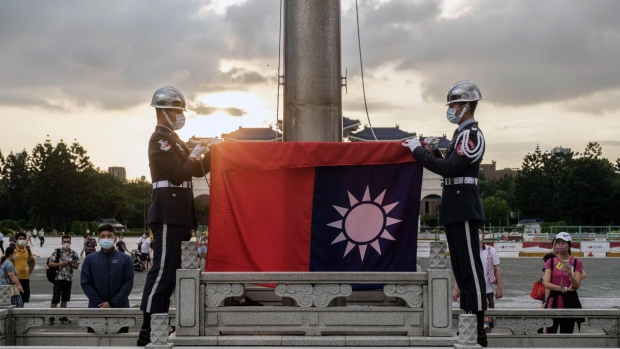Sep 22, 2022
Taiwanese Independence Is a Charging Rhino That Must Be Stopped, China Says
, Bloomberg News

(Bloomberg) -- China’s foreign minister compared the drive for Taiwanese independence to a charging rhinoceros that must be stopped in its tracks, and blamed the US for speeding it along.
Foreign Minister Wang Yi said legislation under consideration by US lawmakers threatens the foundation of US-China ties. He said voices advocating the independence of Taiwan, which Beijing claims as its territory, have grown because of US support. He said that ties between the US and China were at a “low ebb.”
“Taiwan independence is like a highly disruptive gray rhino charging toward us that must be stopped resolutely,” Wang said in a speech at the Asia Society in New York, where he was attending the annual gathering of the UN General Assembly. “We have always worked with the greatest sincerity and effort to pursue peaceful reunification, but we will never tolerate any activity aimed at secession.”
China’s authorities have used the term “gray rhinos” in the past to refer to highly probably, high-impact financial hazards that risk being overlooked. They include shadow banking, property bubbles and local government debts.
Relations between Beijing and Washington have deteriorated further since US House speaker Nancy Pelosi’s visit to Taiwan in August triggered the Chinese army’s most provocative drills around the islands in decades. China also halted climate and military talks with US, though the leaders of the world’s two largest economies may meet on the sidelines of international summits taking place in Asia in November.
Although Taiwanese President Tsai Ing-wen’s party was founded on a promise of independence, she has avoided overt moves toward a formal break, saying a legal change is unnecessary because she already leads a sovereign nation. Most Taiwanese residents prefer maintaining the status quo, according to government surveys, with about a quarter supporting independence at some point.
In an interview with “60 Minutes” that aired earlier this week, President Joe Biden said independence was something for the Taiwanese people to decide. US policy has long been that it doesn’t support Taiwan’s independence or unilateral changes by either side.
Wang is slated to meet US Secretary of State Antony Blinken by the end of the week. In a signal of low US expectations for a better relationship, the US characterized the meeting as no more than part of “ongoing efforts to maintain open lines of communication and manage competition responsibly.”
Wang’s comments marked only the latest instance of the two sides trading blame over their soured ties. The Biden administration has said China has become far more aggressive toward Taiwan, and faulted President Xi Jinping’s government over a crackdown on ethnic Muslims in Xinjiang and the rollback of political freedoms in Hong Kong.
The US has also criticized China for refusing to condemn Russia for its Feb. 24 invasion of Ukraine.
In the speech, Wang reiterated a litany of Chinese complaints, accusing the US of refusing to lift tariffs against China, forcing other countries to pick sides and deviating “dangerously” from the right path on US-China ties.
(Updates with description of “gray rhinos” in fourth paragraph.)
©2022 Bloomberg L.P.







